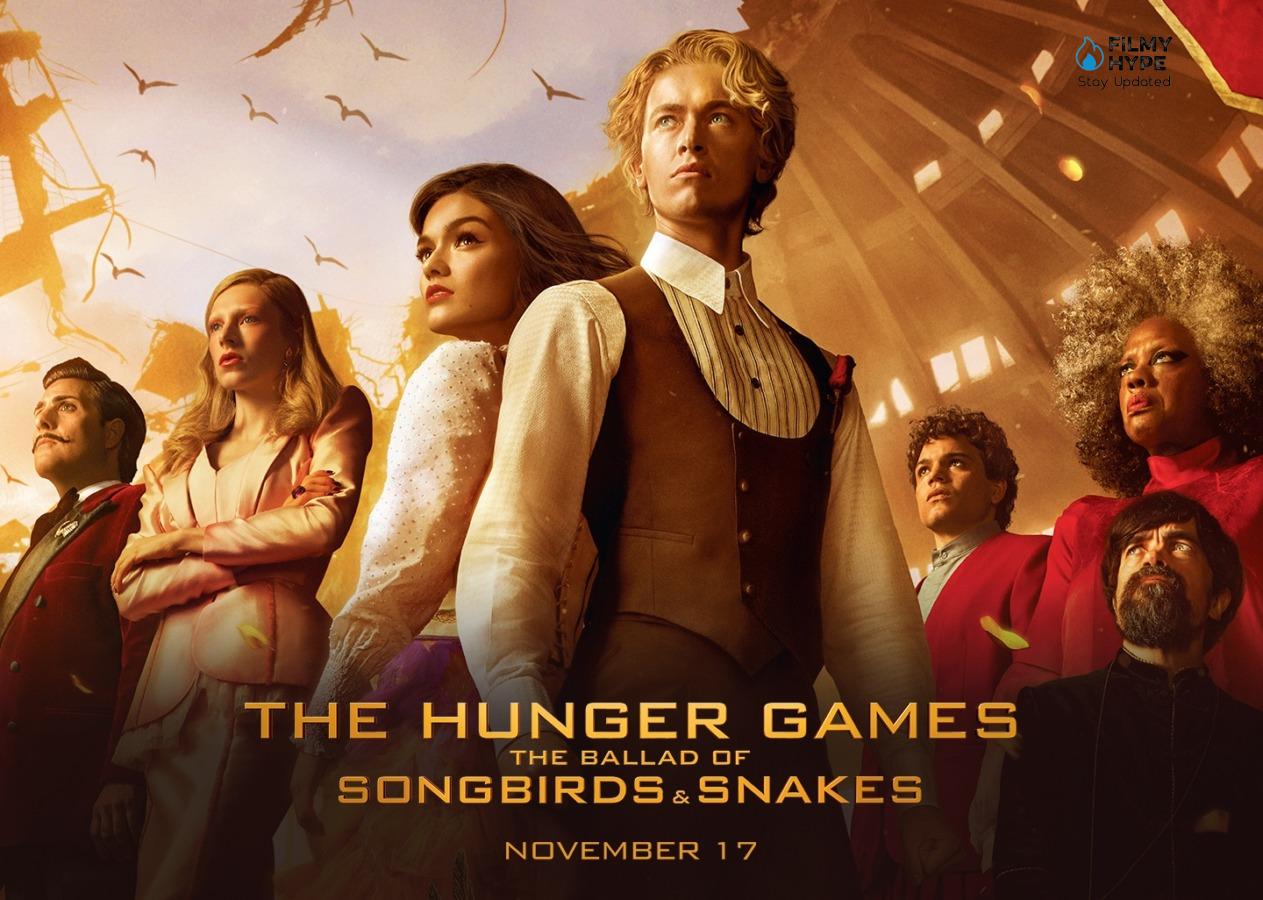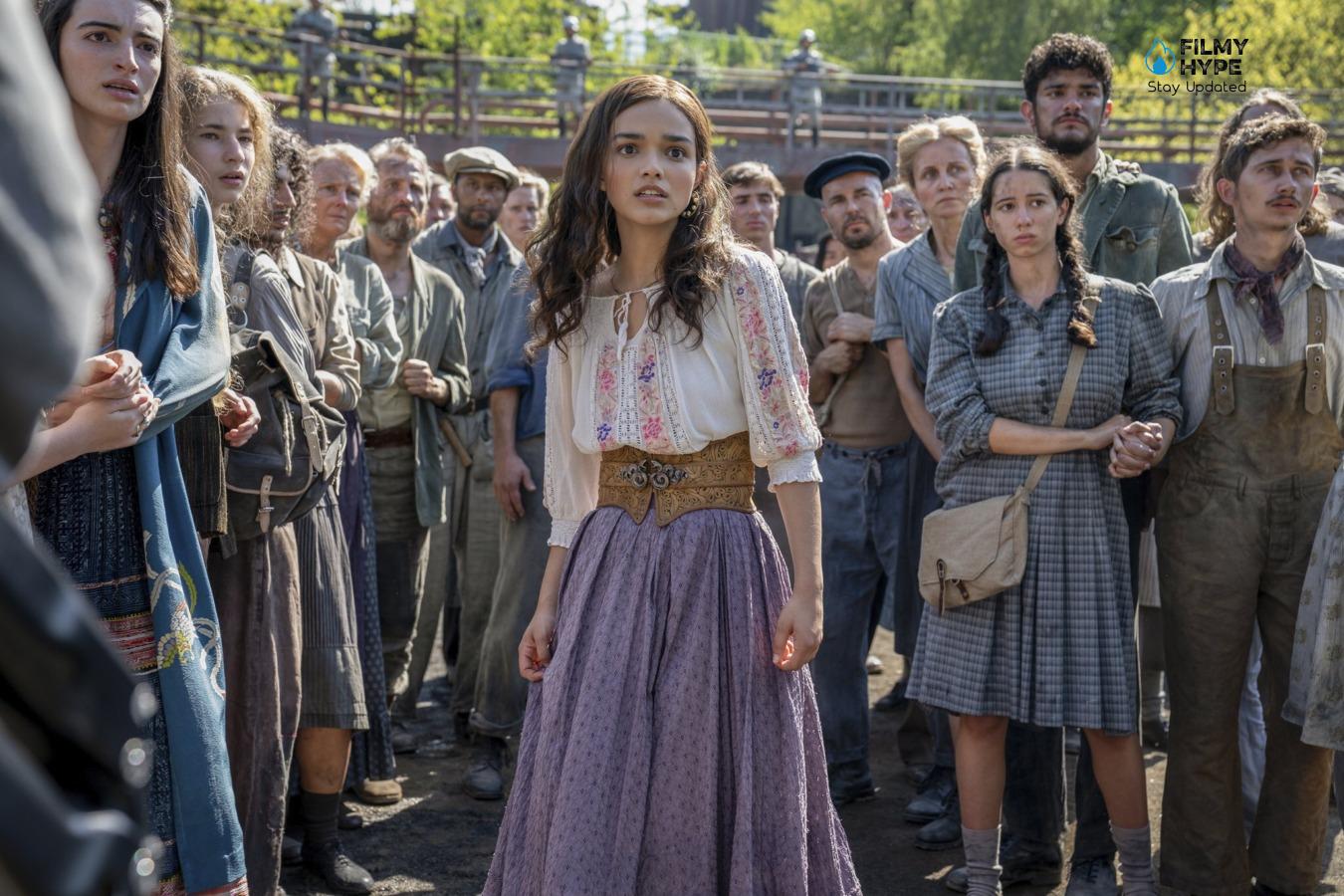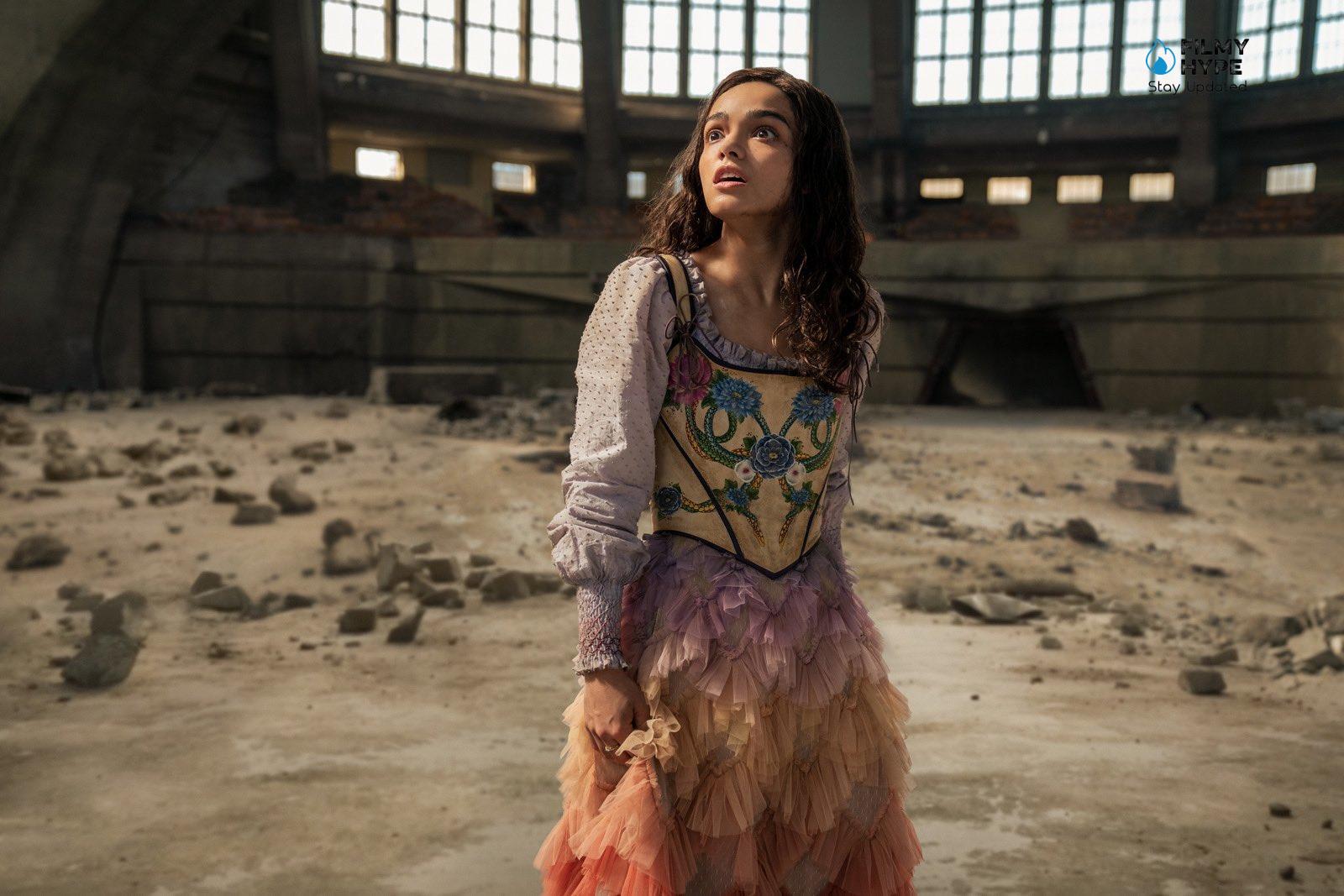The Hunger Games: The Ballad of Songbirds & Snakes Review: Standing Alongside The Best Chapters Of The Main Film Saga
Cast: Tom Blyth, Rachel Zegler, Peter Dinklage, Hunter Schafer, Jason Schwartzman, Josh Andrés Rivera, Viola Davis
Director: Francis Lawrence
Where We Watched: In Theaters
Filmyhype.com Ratings: 4/5 (four stars)
Hunger Games fans: are you ready to return to Panem? The Hunger Games: The Ballad of Songbirds & Snakes, a prequel film to the original trilogy. We saw the world premiere of the new film in the saga at Lucca C&G and we can tell you with enthusiasm that the feature film did not disappoint our expectations. The Hunger Games: The Ballad of Songbirds & Snakes is a faithful transposition of the paper counterpart, a film markedly divided into three parts starring a character who is never idolized or justified. Coriolanus Snow is the villain of the Hunger Games saga and in the new film, fans will better understand his origins and his rise to power. It’s not a perfect film but it’s a great product. Here’s our review of The Hunger Games: The Ballad of Songbirds & Snakes. Marketing stunt, relaunch of the franchise? In the beginning, the intentions were not entirely clear, but it was immediately known that the novel would be adapted into a film (obviously ed.).

Indeed, there is a passage to clarify. The Hunger Games: The Ballad of Songbirds & Snakes was announced even before the publication of the book, a characteristic not all that common with film adaptations of the novels. Upon the release of the book – published in Italy by Mondadori, like the entire main saga – sales of the novel skyrocketed, but the expectations of many fans were disappointed. The novel was not considered up to the standard of the original trilogy, although the last book in the saga was still the least appreciated. We began to fear for the film, but there was still a lot of curiosity around the project. Why wasn’t Collins’ novel warmly received even though fans had long been clamoring for a prequel story? Probably because the absolute protagonist of the new story was himself, Coriolanus Snow, the great antagonist of the original trilogy. The novel – mistakenly – was considered by many as a sort of useless sanctification of an unscrupulous character who did not deserve such treatment. It must be said, however, that the novel has a completely different intention.
The Hunger Games: The Ballad of Songbirds & Snakes Review: The Story Plot
The new film in the Hunger Games saga is set several years before Suzanne Collins’ trilogy, precisely on the occasion of the tenth edition of the games, when Coriolanus Snow is still a young student in Capitol City. At the end of the courses, generally, the most brilliant student of the Academy receives a prize but this time the criteria are different: whoever is the best sponsor for one of the tributes will be able to win it. The story therefore takes place 64 years before the edition that sees Katniss Everdeen as a tribute from District 12: it is interesting – but at the same time disturbing – to observe the structure of the first Hunger Games, the first experiments that then gave shape to the innovations seen in other films.
The human being is punished and at the same time tested in an oppressive and suffocating arena, where the tributes, announced without a name, are treated even more like beasts by the Capitol system. The new film by Francis Lawrence is divided into three parts which help to mark the three stages of evolution of the protagonist: a more than functional division exactly as happens in the novel, which in the case of a feature film lasting 2 hours and 38 minutes certainly helps more to “keep in order” all the narrative connections. A mechanical division is not to be expected, but rather a harmonious and consequential one, even if the intense final part requires a greater sprint from the spectator.

Divided into three parts, the film gradually tells the story of Coriolanus, a young boy from the Capitol, the son of a pacifist general, and the only male heir of what remains of the old illustrious Snow family. Coriolanus lives with his grandmother and cousin Tigris and attends the Capitol Academy, disguising himself well among all the other snooty students in the city and eager for the Academy’s highest prize, the Plinth Prize, given to the most illustrious student with the highest grade point average. On the day of the prize delivery, however, things don’t go as planned.
Coriolanus and all the other students discover that to obtain what they most desire they must participate as mentors in the Tenth Hunger Games, the first Hunger Games in history to be real shows, during which the mentors and their tributes must work together so that these the latter obtain support and donations from the public. Coriolanus becomes the mentor of the District 12 tribute girl, Lucy Gray: a skinny, bland girl with a nightingale voice. For the boy, it becomes a challenge not only against the Hunger Games but also against himself, as he will have to try to make Lucy Gray win and obtain her prize. However, things get complicated when Coriolanus mixes strategy with heart, games with his interest in Lucy Gray in a dangerous game that will lead him to choose between himself, ambition, and love.
The Hunger Games: The Ballad of Songbirds & Snakes Review and Analysis
The Hunger Games: The Ballad of Songbirds & Snakes, as fans will know, is a prequel set several decades before the Katniss epic. The story starts with that first, historic revolt which saw the inhabitants of the Districts of Panem rebel against a despotic and cruel government. An event which, among the many victims, included above all the then president of Panem. The coup left little Coriolanus Snow orphaned, and his family fell into disgrace, losing the prestige it had enjoyed in previous years. We arrive at the “present” of the plot: a young Snow has dedicated his life to bringing the name of his house back to the top, but there is one last challenge to face to regain the rank he thinks he deserves by right. Impress the audience of Panem in the role of Mentor on the occasion of the Tenth Hunger Games: a delicate edition of an event in which the public has gradually lost interest. So, what is the best way to improve the ratings of a live worldwide carnage? But of course, turn it into a show: highlight the contestants, get to know and learn more about the people and human beings behind the Tributes.
Snow, as a vulture, calculator, and social climber, seizes the opportunity when he understands who he will have to lead inside the arena: Lucy Gray Baird, a tribute from District 12, a girl sui generis, impetuous, and combative. And so, Coriolanus decides to exploit his pupil’s over-the-top personality to his advantage, helping to make the tenth Hunger Games a spectacle never seen before. But it is also true that humanity that hides behind violence can lead to unexpected consequences. And here Coriolanus will learn at his own expense what many years later, as an old, cunning, and cruel President of Panem, he said to the young Katniss: that it is precisely what we love most, sometimes, that destroys us. And if you want, here’s an exclusive clip on Snow from The Hunger Games: The Ballad of Songbirds & Snakes.

In adapting rather faithfully the events of the novel from which it is based, The Ballad of the Nightingale and the Serpent puts together a very long story (over two and a half hours), divided into three acts that mark the key moments of the story: before, during and after the Hunger Games. It is a fascinating story, as well as complex, thanks above all to the two main characters: ambiguous figures. Of which, until the end, we cannot fully understand their feelings and intentions. In this, Tom Blyth and Rachel Zegler (the two faces of Coriolanus and Lucy Gray respectively) deserve more than applause. For their performances, but above all for their excellent understanding, and intense and complex chemistry in bringing to the stage a controversial relationship made up of attraction, love, doubts, suspicions, and betrayals. Here, a non-canonical, non-obvious love story, in some ways opposite to the love told in the classic Hunger Games saga, but right, indeed perfect, consistent with the characters it wants to tell.
The only flaw of arriving at the third act with still too many things to say, and too little time to do it. Compared to the first two, it is slightly more subdued and hastier, but still powerful in its message and staging. A cast that is in a state of grace, to say the least, with praise that is not limited only to the two protagonists. But also, to Peter Dinklage, who punches the screen in the limited amount of time given to him as Dean Casca Highbottom; to an exceptional Viola Davis, histrionic, magnetic, and splendidly “repugnant” in those of Dr. Gaul. And to all the surrounding faces, which together with the main ones make up a mosaic of characters in full Hunger Games style: bizarre, ambiguous, fascinating. Guided by the best demiurge that the Hunger Games film saga has known: Francis Lawrence consciously directs a material he knows and shapes with a high-school stylistic and identity imprint, emphasizing a staging that is as crude as possible.
In some moments, perhaps, even more graphic than the main tetralogy – on a constant and continuous surprise effect, on simplistic but convincing and plausible action scenes (and speaking of the saga, here’s where to catch up on The Hunger Games in streaming and on TV). Above all on a pragmatic search for framing which, however, is not afraid to indulge in the right (and appreciated virtuosities). This is also thanks to an artistic direction that makes excellent use of the dystopian and retro-futuristic science fiction of the franchise, expertly playing with the sets and technologies to create a vague and pleasantly vintage setting. All without ever losing sight of the elements that make The Hunger Games such: as the quotes to the references, up to the excellent musical score. Which accompanies us until the end with enveloping and memorable melodies, which still echo the song of the Mockingjay. And they remind us that, in the end, returning to the hung man’s tree is always beautiful, poignant, and exciting.

In The Hunger Games: The Ballad of Songbirds & Snakes the merits are certainly much more considerable than the defects. As we mentioned at the beginning, the film is a faithful, if not slavish, adaptation of its paper counterpart. Despite the fidelity to the source and the correct transposition, some cuts were inevitable which slightly penalized the depth of the characters. Several scenes that served to underline the importance of the white rose within the Snow house are missing, the love story between Snow and Lucy is too rushed and the character of Coriolanus could have been better developed with regards to jealousy towards his beloved. We cannot fail to underline that some plot twists, which in the novel we already learn after the events are over, are revealed in the film practically immediately, thus ruining the surprise for the viewer.
The duration of the film, 2 hours and 36 minutes does not appear excessive and does not weigh on the viewer in any way. Without a doubt, the first two parts of the film are more compelling and dynamic while the last one appears more relaxing and slower, but it could not have been done otherwise given that the paper version also follows this dynamic. In conclusion, the film can bring the viewer to the Panem that he knew and loved in the films with Jennifer Lawrence. The Hunger Games: The Ballad of Songbirds & Snakes is a spin-off that better characterizes the villain of the mother saga without weakening or justifying him. This is not the usual film made years later just to ride the wave of reboots, but it has a lot to say and doesn’t hesitate to do so. The Hunger Games: The Ballad of Songbirds & Snakes awaits you in cinemas from November 15th.
The Hunger Games: The Ballad of Songbirds & Snakes Review: The Last Words
The Hunger Games: The Ballad of Songbirds & Snakes is the perfect staging of the novel of the same name by Suzanne Collins. A prequel made and designed for fans of the original saga who can’t wait to return to Panem. A carbon copy of the literary work, it transposes the merits but also the defects of a novel that was lukewarmly received even by the fans of the saga themselves. Francis Lawrence as director demonstrates his ability to master the world built by the bestselling writer, testing a cast of more or less well-known stars perfect for the roles assigned. Despite some lengthy and overly didactic scenes, the return to the Hunger Games is exactly what one expects: a fan service operation that delves into the past and tells the origin of the villain.







